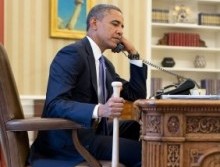
America’s talking loudly, but how big a stick are they carrying? Illustrative. Photo Courtesy of Official White House Photo by Pete Souza
It was a subtle move last week, the US agreeing to send less than a dozen Apache attack helicopters to Egypt. Less subtle, but still quiet, was the American dismay at the alliance between the so-called “moderate” Palestinians in the Fatah movement and the radical Hamas terror movement. But uneventful as these US responses are, they nonetheless represent the beginning of a big change: America is getting off the fence in the Middle East.
The nuclear talks with Iran, the half-involved interest in the Syrian war and the inconsistent support for “democracy” at the expense of Egyptian allies made it appear as though the US was changing sides. The Iran-led axis in this Middle East Cold War, which opposes the Saudi-Egypt-Israeli grouping, was receiving a lot more love from the US than they deserved.
Sometimes it was because their interests aligned—the US didn’t want to fight in Syria, so they willingly stayed out of the battle with the Iranian-backed regime there. And sometimes it was for ideological reasons—such as when the US refused to send attack helicopters to Egypt due to the government crackdown on pro-Islamist protesters there.
But now, the US finds itself in a corner. The Egyptian authorities still may not be as democratic as the US would prefer, but the Americans have seen the error of their ways in trying to reprove the Egyptians in unrelated areas. Helicopters aren’t being used to imprison protesters or issue mass execution decrees on political opponents, they’re being used to fight AL-Qaeda wannabes.
And those Al-Qaeda wannabes have caused a huge mess in the Egyptian Sinai, which borders Israel. The Egyptian army has been fighting a miniature war there and Israel has been hit with rocket fire from there as well. Combine that with the growing reach of terror in Egypt—even the capital region isn’t safe—and it was becoming obvious that US ideology wasn’t more important than security.
The US might not like what the Egyptians are doing, but they don’t want Al-Qaeda sparking a new civil war in the Middle East either.
Similarly, the US has long been supporting the Fatah Palestinian movement as they negotiate with Israel. But the Americans were unusually quick and strong in expressing their disapproval when Fatah announced a reunion with Hamas.
In short, the US has tried playing both sides, being the neutral party trying to bridge gaps, and it hasn’t worked. The gaps between the Iranian-led radicals and the more West-supporting Arabs and Israelis are too wide.
So now, with things unraveling in Egypt and collapsing in the Israel-Palestinian peace talks, the US is being forced to choose sides. In a couple months, they likely will be forced again when the original deadline to reach a nuclear deal with Iran expires. As of now, it doesn’t look like the Iranians will be making the concessions needed for a legitimate agreement.
What will the US do then? Based on their responses in Egypt and Israel, it looks like they just might choose well.
The Cold War with the Soviets forced the US to work with allies with whom they disagreed, sacrificing politics for military success and balancing values with security. While it’s not ideal, sometimes it’s necessary—if it’s done the right way. Supporting Bin Laden in his fight with the Soviets in Afghanistan may not have been the wisest move, backing the Polish and buying off the Egyptians worked.
And so now, the US needs to make wise decisions in a new Cold War. Hope for peace can’t overcome the realities of threats. True, the Americans are mostly acting because they’ve been fenced in by what’s happening. But at least they’re off the fence.
(By Joshua Spurlock, www.themideastupdate.com, April 27, 2014)
